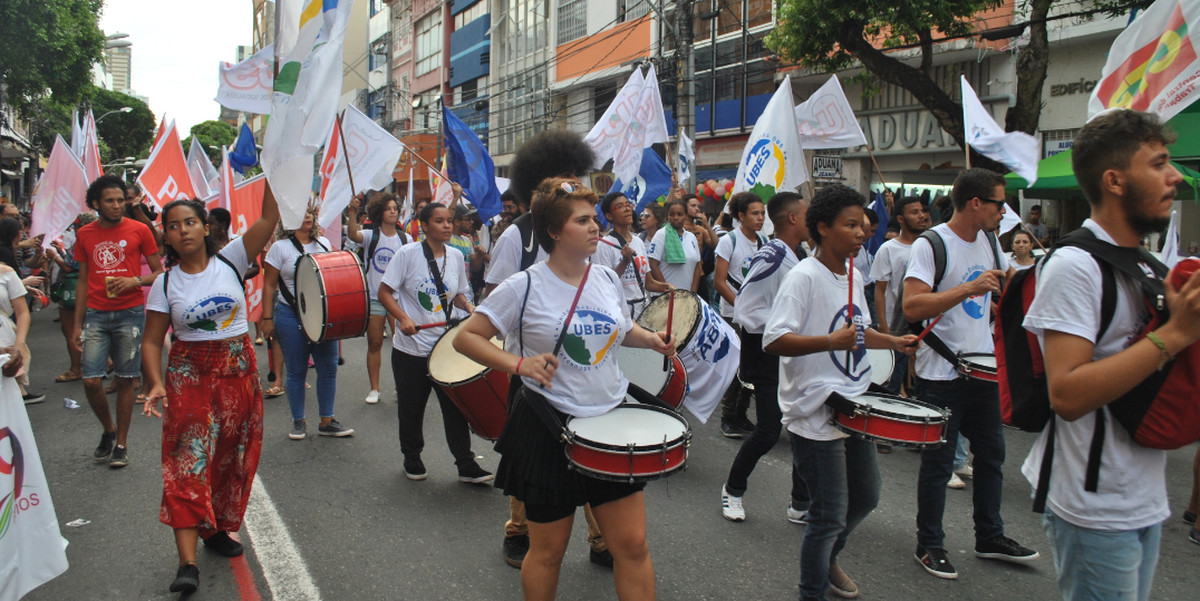A short CIDSE story by Markus Brun*
German version
2001 was not only the year of 9/11 and the start of Wikipedia, it was also the first meeting of the World Social Forum (WSF) in Porto Alegre. I was aware that many of the world’s business and political leaders gained a lot of media coverage for their World Economic Forum every year in Davos, challenged by an NGO coalition meeting called a “Public Eye on Davos” and that many activists tried to demonstrate in and around Davos. I was less aware of the World Social Forum convened simultaneously in Brazil under the theme “The World is Not a Market” that brought together representatives from 122 countries, including trade union leaders, politicians, community leaders, youth and indigenous activists.
The World Social Forum was born offering a self-conscious effort to develop an alternative future through the championing of counter-hegemonic globalization. It defined itself as “an opened space – plural, diverse, non-governmental and non-partisan – that stimulates the decentralised debate, reflection, proposals building, experiences exchange and alliances among movements and organisations engaged in concrete actions towards a more solidarity, democratic and fair world….a permanent space and process to build alternatives to neoliberalism.” The attendants of the WSF believe that another world is possible.
From the start, CIDSE, and especially its French member organisation CCFD-Terre Solidaire, played a very active role in this forum. CIDSE remains a member of the International Council that approved the charter of the Forum and organised delegations to attend almost all 16 editions up to now.
When I joined for the third edition in 2003, some 20 staff of CIDSE member agencies were present. CCFD-Terre Solidaire (France) and CIDSE’s Canadian member, Development and Peace brought a lot of activists with them – CCFD alone more than 100 people. The fascinating workshops on financing for development were an opportunity to meet and discuss with partners especially from Latin-American countries. The days were usually long: a lot of food for thought, strategizing, and occasionally excessive interventions. Fortunately, Jean-Marie Fardeau, then Secretary General of CCFD-Terre Solidaire and President of CIDSE was a specialist of local caipirinha bars. I always admired Jean-Marie’s capacities to give concise speeches in the early morning after a long and intensive night.
2004 WSF in Mumbai (India) was a historical landmark when the forum really became global. CIDSE, together with Caritas Internationalis, organised a big panel with partners, scientists and politicians: The question “how to redistribute power and wealth globally” was addressed by “VIP’s” such as Vandana Shiva or Eveline Herfkens (at that time, UN secretary general’s coordinator for the Millennium Development Goals (MDG) campaign).
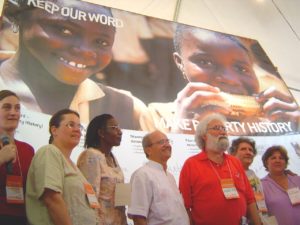
WSF 2005, Porto alegre
CIDSE and its members did not only meet partners, consult scientists and exchange with other activists, they also did real advocacy work and gave increasingly attention to professional media work. One year later – back to Porto Alegre – CIDSE started its MDG campaign which called not only for tax justice but also for 0.7% GDP for development.
A campaign that – at least in Switzerland – was a big success since the Swiss parliament introduced 5 years later an official 0.5% policy.
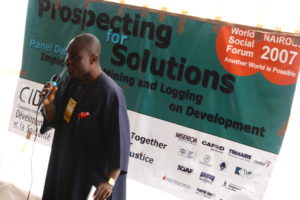
Many CIDSE members were also involved in regional and thematic fora that took place between 2 global editions, including WSF 2007 in Nairobi. CIDSE organised a panel on the impacts of oil, mining and logging on development with the UN High Commissioner for Human Rights Mary Robinson and continued its work around finances.
The closing ceremony was impressive: not a carnivalesque party through the city (as we were used to in Brazil), but a march through the Kibera slum; thousands of people expressed quietly their solidarity with those who have almost nothing to eat.
Two years later a colourful, festive and rainy forum in the Amazon, where CIDSE and its partners took up their activities around extractives already started in Nairobi. Within CIDSE, the 2011 Forum in Dakar mobilised many more than the one in Belem.
After the participation of the CIDSE Secretary General, Christiane Overkamp in the 2005 WSF in Porto Alegre, her successor Bernd Nilles came along with a big delegation from Brussels. His aim was not only networking and strategizing, but successful media work and an evening party for CIDSE participants.
In 2013 and 2015, the WSF stopped in Tunis. CIDSE discussed there with its partners mainly the shift of paradigms in development and started its reflexions around new ways of working together globally and system change, not to mention Financial Transaction Taxes, climate change and agroecology.
2016 was the first WSF to be held in a Northern Country. Hard to get visas for colleagues and friends from Southern countries but impressive mobilisation of social movements in Canada. Inspired by Pope Francis, CIDSE promoted catholic social teaching: Laudato Si’ became a prominent topic – but this was primarily a new motivation premise to examine ongoing global challenges such as the effects of climate change, financial systems and hunger.
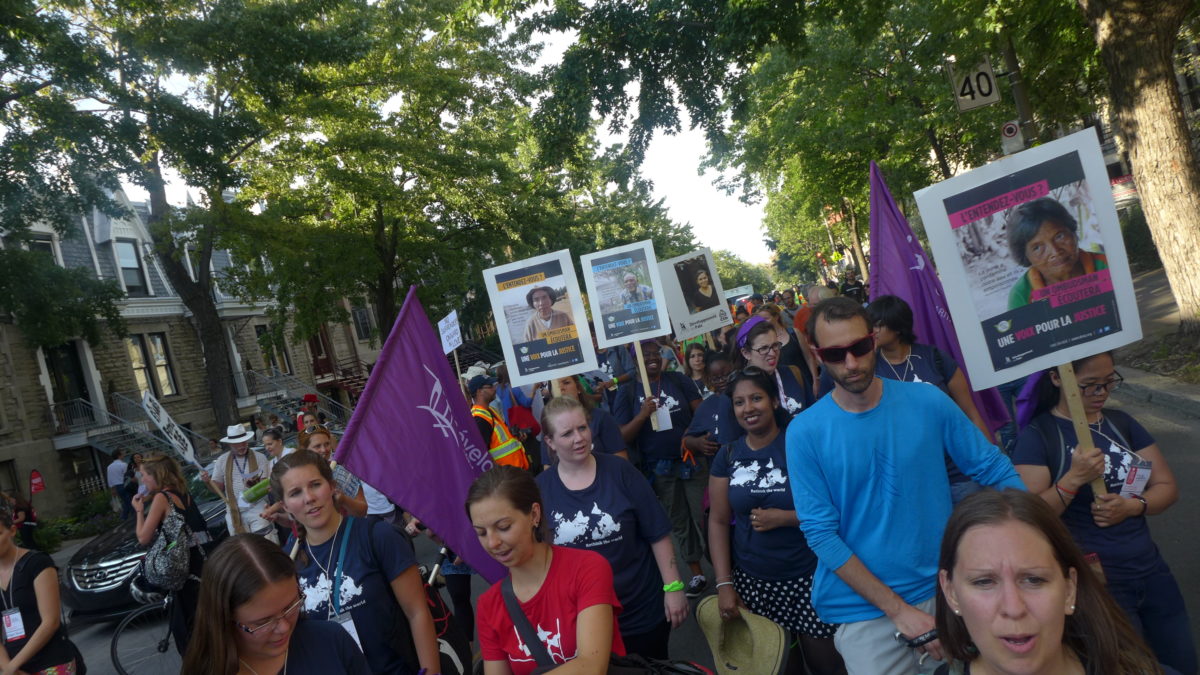
2018 back to Brazil: Salvador di Bahia hosted the last physical World Social Forum. This year, on its 20th anniversary, the most important global process to invent another world has to reinvent itself: it has to go online. May this new and innovative format allow creative synergies and actions in order to achieve a true paradigm shift that leads to a just and sustainable redistribution of wealth and power globally!
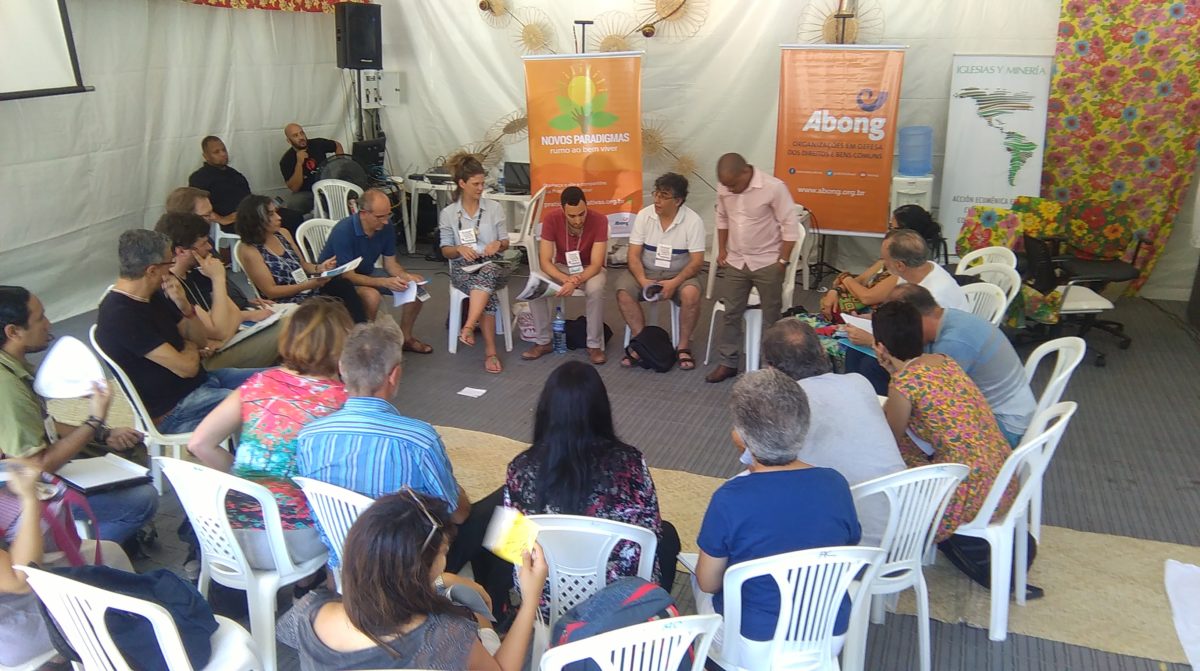
The World Economic Forum will not take place in Switzerland either. It will also be substituted online and possibly gather later this year in Singapore. The World Social Forum hopes for a physical edition later this year or at the beginning of 2022 in Mexico.
About the Author:
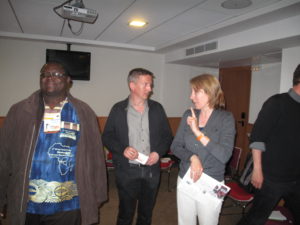
at WSF 2013, Tunis
Markus Brun is Head of the International Cooperation Department at Fastenopfer, CIDSE’s Swiss member organisation and is representing CIDSE in the WSF International Council.
Additional reading:
“20 years later, which direction for the World Social Forum?“ by Gilio Brunelli, former Director of the International Programmes Department of Development and Peace (Canada)
Cover photo: Opening march, WSF 2018 Salvador di Bahia. All photo credits: CIDSE.

